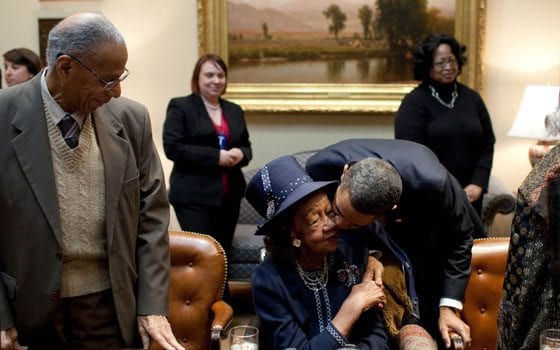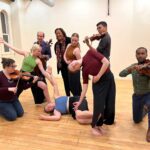

Author: AP /Ron EdmondsDorothy Height, a longtime leader of the U.S. civil rights movement and the chairwoman of the National Council of Negro Women, died April 20, 2010 in Washington, D.C. She was 98. Height is shown here greeting President Obama after her speech at the Uncommon Height Gala honoring Oprah Winfrey in Washington, D.C. on Thursday, June 4, 2009.
ATLANTA — The recent deaths of Dorothy Height and Benjamin Hooks, two icons of the civil rights era, nudge those who have come behind them closer to the control for which they have clamored.
It is a prospect that is at once enticing and intimidating for the movement’s heirs, many of whom have waited years for their turn and a chance to further the progress of black America. Those years have caught up with both young and old supporters, and the graying civil rights generation has no choice but to step aside.
The next generation must decide whether it will step up as the nature of the struggle is in question and the future fight takes on a new identity.
It’s put up or shut up now, said the Rev. Al Sharpton.
“I remember for years we said, ‘Give us a chance,’ ” Sharpton said. “Well, we’re center stage now. What are we gonna do?”
At 55, Sharpton is considered young among civil rights activists. He was groomed by people like Height and Hooks to lead after they left.
“They knew the struggle would continue beyond them,” said Sharpton, who founded his National Action Network nearly 20 years ago. “We are facing more institutional inequities. These matters are not as dramatic as they were in their time, but they’re just as insidious.”
For years, the heroes of the 1950s and 1960s kept us connected to a time when the battle for equality in this country was real and present for millions of black Americans, decades away from the election of the first black president.
The larger-than-life examples of Andrew Young, Joseph Lowery and John Lewis, who marched alongside the Rev. Martin Luther King Jr. and lived to tell us about it year after year, were constant reminders that the fight is not over.
When she died last week at 98, Height was one of the few female voices of the movement. Her activism stretched from the New Deal to marching alongside King before she witnessed the historic election of President Barack Obama.
Hooks led the National Association for the Advancement of Colored People for 15 years after he was inspired to fight against social injustice and bigotry as a young soldier guarding Italian prisoners of war while serving overseas in the Army during World War II. Foreign prisoners could eat in “for whites only” restaurants, but he could not. He died two weeks ago at the age of 85.
The struggle they leave behind is far different from the one they inherited in a segregated America. Today, the Rev. Raphael Warnock of MLK’s Ebenezer Baptist Church in Atlanta is carrying the mantle of social justice theology, fighting for voting rights and financial literacy and against disparities in the criminal justice system — without the permission of his elders.
“I don’t know that anybody handed that generation the leadership,” said the 40-year-old Warnock. “I think they took it. And the onus is on us to assume leadership and not wait on somebody to give it to us. We are clearly witnessing the changing of the guard.”
This generation does not live in fear of biting dogs or the sting of a fire hose, but must still fight to ensure equal access to education and employment. Having hundreds of black elected officials across the country does not eliminate the need to advocate the right to vote.
“Losing Dr. Height hurts immeasurably, but it also inspires unconditionally,” said Julianne Malveaux, president of the all-female, historically black Bennett College. “When we think about the struggles she identified with and the work that she did, she’s really left us with a social, economic and legislative agenda.”
Malveaux said that many young people are respectful of history and may be ready to carry on the work of Height’s mission, but others may see her labor as part of a bygone era.
“They have been seduced by our progress to feel that the civil rights movement may not be necessary,” she said.
The call to action now extends not to an aging few, but to countless blacks from 18 to 70 — still young, compared to those who were stirred to action in the last century. Already there are those who have answered. The NAACP has at its helm the youngest president and chairwoman in its 101-year history. The Southern Christian Leadership Conference is preparing to install as its new leader Bernice King, the youngest daughter of King, the organization’s most famous founder. And the executive director of Sharpton’s National Action Network is under 30.
Whether they can rally their peers as their predecessors rallied for the betterment of a people remains to be seen. But, after years of asking, they will soon get their wish.
Associated Press

![Banner [Virtual] Art Gallery](https://baystatebanner.com/wp-content/uploads/2024/04/NJ-H_1-150x150.jpg)




